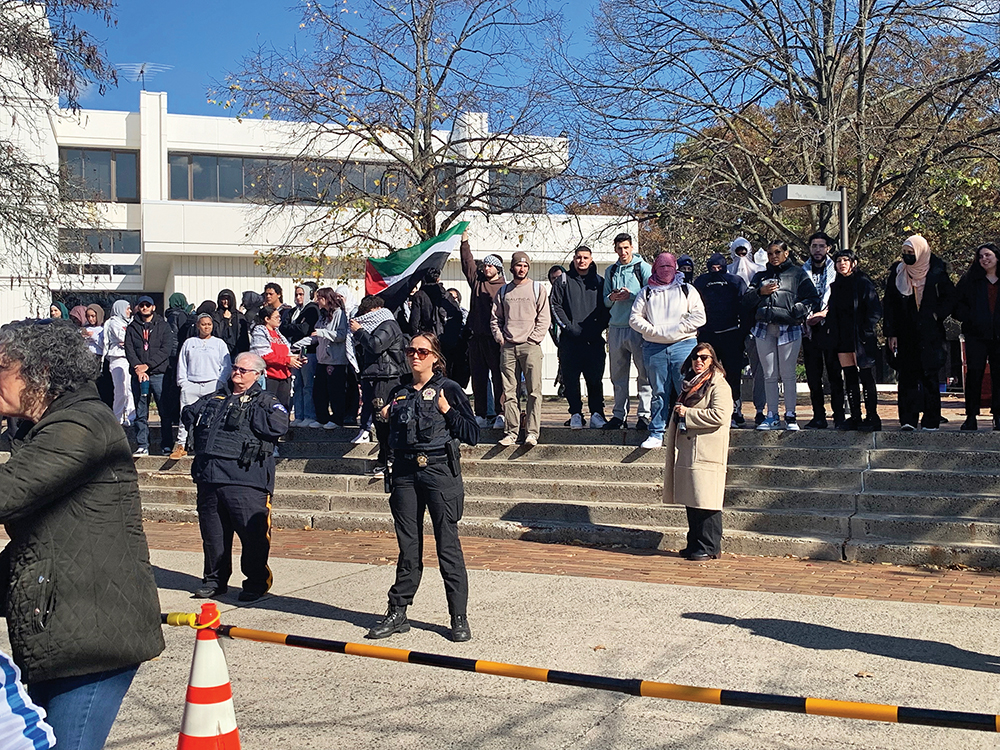
Dozens of Jews from Livingston, West Orange and Montclair joined Jewish students from Montclair State University to show their support for the small but beleaguered group who feel unsafe and forgotten.
“It’s getting harder and harder to be a Jew on campus,” one student told the group. “We are tired. There is no excuse for hatred.”
With songs and speeches, the students and community supporters sought to create a positive atmosphere. Rally attendees held photos of those being held hostage and held a moment of silence in their honor. They sang songs like “Oseh Shalom” and “Yerushalem Shel Zahav” (“Jerusalem of Gold”).
Some of the students shared their experiences on campus while they also received support from several local rabbis who addressed the group. According to the Hillel president on campus Aliza Rhein, the experience of Jewish students at Montclair State University is “abhorrent. I just don’t feel comfortable.”

She said that solidarity shown by the larger Jewish community was “incredibly meaningful. Being on campus feels so isolating and lonely, so seeing so many other Jews show up reminded me that I am not alone.”
Last week’s pro-Israel rally was held in the university’s quad, where at least two large-scale anti-Israel rallies — attended by people who have no connections to the school — have already been held. To ensure the safety of the Jewish rally-goers last week, police officers were stationed around the quad and separated rally-goers from anti-Israel protesters standing just a few feet away.
“Don’t engage,” the student organizers of the pro-Israel rally urged, even as the anti-Israel counterprotesters with their keffiyehs and Palestinian flags made their presence felt at times, breaking into chants of “Free Palestine.” “Your flag is dirty,” shouted one student. And when a lone soldier from the Israel Defense Forces who grew up in West Orange addressed the crowd, another anti-Israel protester shouted, “You’re an f—ing pig.” He was escorted away from the rally by the police.
And as the pro-Israel rally broke up, the protestors shouted “Allahu Akhbar.”
As they shouted, one of the students at the pro-Israel rally said that she fears coming to school every day. “I have pepper spray, and it’s not enough.”
For its part, the university said they are listening to the concerns of Jewish students, noting that Jewish student groups have met with school officials several times since the war began. They also said that the university police department is “actively monitoring the situation.”
“We understand some members of our university community are fearful. That is a natural response, given all the turmoil going on in our world,” said a spokesperson for the university. “Antisemitism has no place on our campus, and we unequivocally condemn it.”
The concern Jewish students on the Montclair State campus have is not unique. According to a survey conducted by Hillel International on Oct. 18-19, 58% of Jewish students feel they are not supported by their college or university and nearly as many say they feel unsafe on campus.
A quarter of students reported an act of violence of Jew-hatred on campus and 40% say it’s hard to share their views in class or on campus.
“The frightening incidents we’re seeing on campus today did not start on Oct. 7. They are a direct result of far too many universities failing in their legal responsibility to promptly, publicly and forcefully address the antisemitism that has been simmering on their campus for years,” said Alyza D. Lewin, president of the Brandeis Center for Human Rights Under the Law, in a press release. “This explosion of Jew-hatred was foreseeable and preventable. It’s high time for universities to enforce the law and protect their Jewish students.”
The Brandeis Center, working along with Hillel International, the Anti-Defamation League and Gibson, Dunn & Crutcher LLP, has announced the creation of the Campus Antisemitism Legal Line (CALL), where Jewish students, their families and Jewish faculty can report incidents of antisemitism and discrimination that may require legal intervention.
According to a release, lawyers will “assess reports of antisemitic discrimination and hate, conduct in-depth, information-gathering interviews, and provide pro-bono representation for victims who choose to move forward with specific cases. CALL will also provide referrals to social services, mental health counseling services, and other relevant support services in their area.”
Faygie Holt is the author of the bestselling Jewish children’s book series, “The Achdus Club,” for girls ages 8 to 11. The books, “The New Girl” and “Trouble Ahead,” are available at Jewish bookstores across the country and online at menuchapublishers.com. An award-winning journalist and editor, Faygie’s work appears regularly on chabad.org and in The Jewish Link among other outlets. Learn more about the author, her books and her writing at faygielevy.com.








